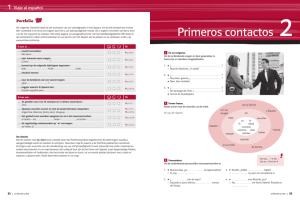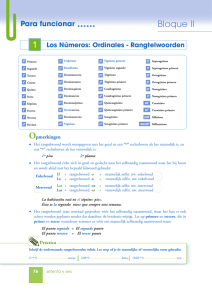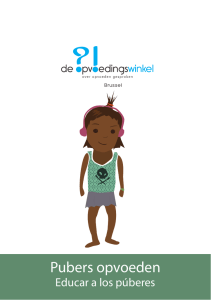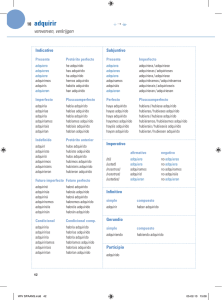Verbs in the Present Tense indicate a current/present action… For
Anuncio
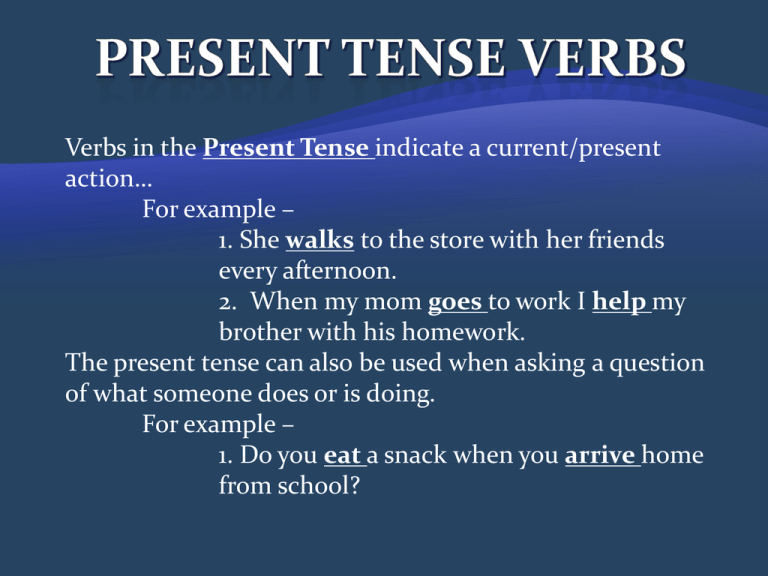
Verbs in the Present Tense indicate a current/present action… For example – 1. She walks to the store with her friends every afternoon. 2. When my mom goes to work I help my brother with his homework. The present tense can also be used when asking a question of what someone does or is doing. For example – 1. Do you eat a snack when you arrive home from school? The 5 major subject groups in Spanish are as follows: Subject English Equivalent Yo I Tù You El/Ella/Usted He/She/You(formal) Nosotros We Ellos/Ellas/Ustedes They(masculine/feminine) You(plural) Subject: Yo Ending: o Subject: Ellos/Ellas/ Ustedes Ending: an In Spanish there are 5 major subject groups that determine verb conjugation in the present tense. Subject: Nosotros Ending: amos Subject: Tù Ending: as Subject: él/ella/ usted Ending: a Subject: Yo Ending: o Subject: Ellos/Ellas/Ustedes Ending: en In Spanish there are 5 major subject groups that determine verb conjugation in the present tense. Subject; Nosotros Ending: emos (IR verbs – imos) Subject: Tù Ending: es Subject: él/ella/usted Ending: e 1. Take the infinitive form of the verb and determine whether it fits into the AR or ER/IR category. 2. Remove the last two letters of the verb… Bailar Bailar + ending 3. Add on the appropriate ending depending on the sentence’s subject. Stem changing verbs have a change in the vowel sound and spelling in all forms except “nosotros.” However, they follow the same ending rules as regular verbs. Examples… Jugar u ue *endings follow regular pattern Entender e ie *endings follow pattern also Although you may feel like this right now, with time you will memorize the irregulars! Dar Hacer Poner Saber Salir Traer Ver Decir Estar Ser Oír Tener Ir Venir Valer Caber Caer doy, das, da, damos, dan hago, haces, hace, hacemos, hacen Pongo, pones, pone, ponemos, ponen Sé, sabes, sabe, sabemos, saben Salgo, sales, sale, salemos, salen Traigo, traes, trae, traemos, traen Veo, ves, ve, vemos, ven Digo, dices, dice, decimos, dicen Estoy, estás, está, estamos, están Soy, eres, es, somos, son Oigo, oyes, oye, oímos, oyen Tengo, tienes, tiene, tenemos, tienen Voy, vas, va, vamos, van Vengo, vienes, viene, venimos, vienen Valgo, vales, vale, valemos, valen Quepo, cabes, cabe, cabemos, caben Caigo, caes, cae, caemos, caen She gets up at 7 o’clock in the morning. ~ Ella se levanta a las siete por la mañana. We cook dinner together everyday. ~Cocinamos la cena juntos cada día. 1. I play with Juan after school. Yo ______ con Juan después de la escuela. 2. Do you have brothers or sisters? ¿ ______ Hermanos o hermanas? 1. Juego 2. Tienes A snap shot of the past Describes a simple, completed action Tells what you did or completed English words in the preterit often end in –ed Examples… I drove to the store and bought four shirts. We met Derek Jeter when we went to the Yankees game. Yo Yo Ending: é Ending: í Ellos/Ellas/ Tú Usteded Ending: aste Ending: aron ~ AR Verbs Nosotros Ending: amos El/Ella/ Usted Ending: ó Tú Ellos/Ellas/ Usteded Ending: ieron ~ER/~IR Verbs Nosotros Ending: imos Ending: iste El/Ella/ Usted Ending: ió Ir Ser Hacer Decir Traer Tener Estar Conducir Andar Poder Poner Querer Saber Venir Oir Leer Creer Traducir Fui, fuiste, fue, fuimos, fueron Fui, fuiste, fue, fuimos, fueron Hice, hiciste, hizo, hicimos, hicieron Dije, dijiste, dijo, dijimos, dijeron Traje, trajiste, trajo, trajimos, trajeron Tuve, tuviste, tuvo, tuvimos, tuvieron Estuve, estuviste, estuvo, estuvimos, estuvieron Conduje, condujiste, condujo, condujimos, condujeron Anduve, anduviste, anduvo, anduvimos, anduvieron Pude, pudiste, pudo, pudimos, pudieron Puse, pusiste, puso, pusimos, pusieron Quise, quisiste, quiso, quisimos, quisieron Supe, supiste, supo, supimos, supieron Vine, viniste, vino, vinimos, vinieron Oí, oíste, oyó, oímos, oyeron Leí, leíste, leyó, leímos, leyeron creí, creíste, creyó, creímos, creyeron Traduje, tradujiste, tradujo, tradujimos, tradujeron It is very important that when conjugating verbs, intended sounds are preserved. In the yo form of the preterit, verbs that end in the following must be changed in order to keep the sound the same. Regular endings stay the same. 1. -Car qu 2. -Gar gu only in the Yo form of the verb 3. -Zar c Examples: o Pagué la cuenta cuando fuimos al restaurante. o Almorcé con mis amigos al picnic.
